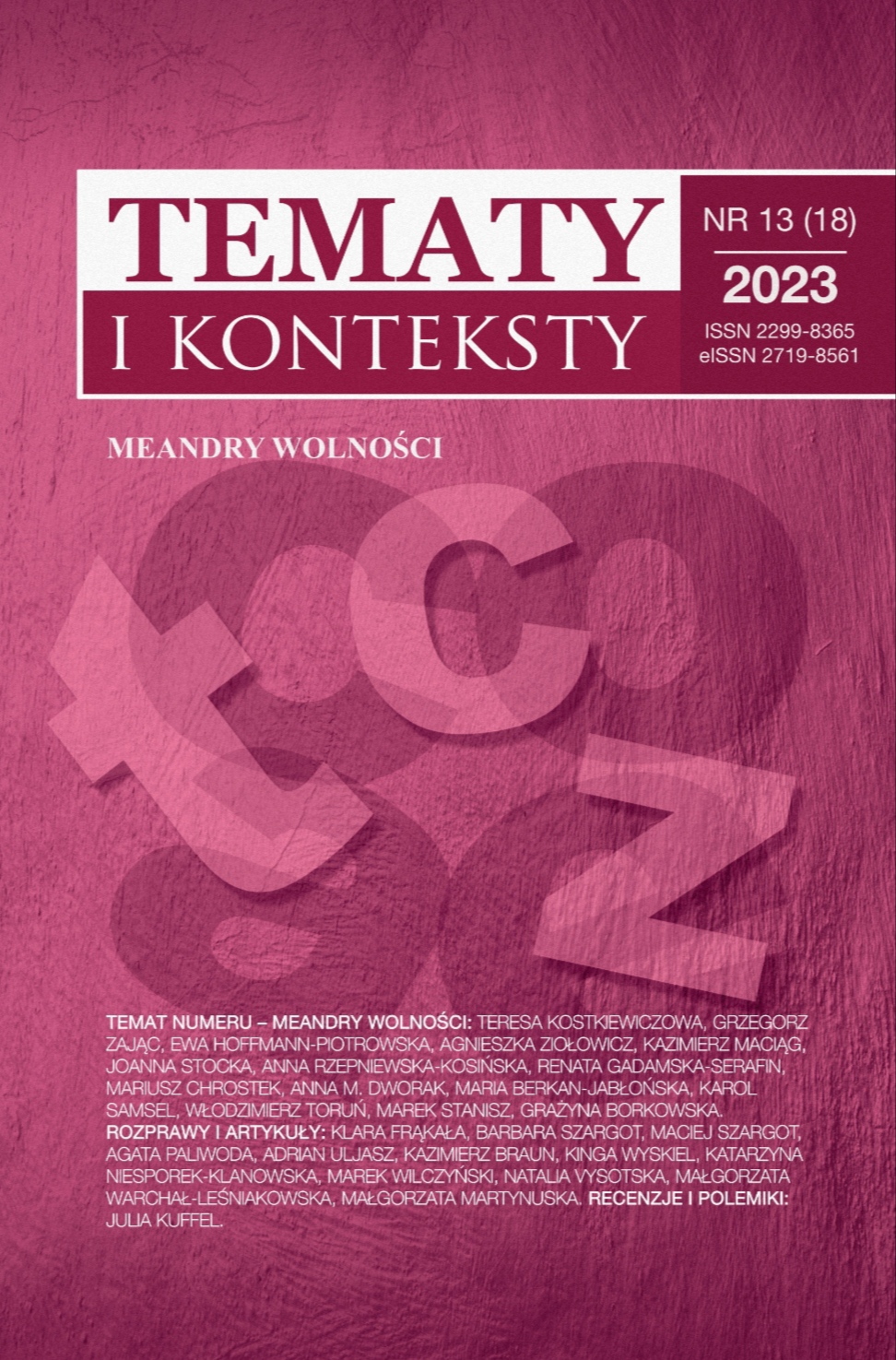Shangri-La jako utopia, święte miejsce oraz więzienie w powieści "Zaginiony horyzont" Jamesa Hiltona
DOI:
https://doi.org/10.15584/tik.2023.25Słowa kluczowe:
utopia, Shangri-La, James Hilton, Zaginiony HoryzontAbstrakt
Celem artykułu jest zbadanie powieści Jamesa Hiltona "Zaginiony horyzont" w kontekście jej utopijnego charakteru oraz historycznych i mitologicznych analogii, które wskazują, że jej miejsce akcji Shangri-La, postrzegane może być jako miejsce schronienia, ale jednocześnie paradoksalne więzienie. Artykuł zagłębia się w historyczny i kulturowy kontekst przedstawienia Tybetu jako świętego i mistycznego miejsca w wyobraźni Zachodu, umieszczając go w kontekście brytyjskiego imperializmu i podkreślając błędne przekonania oraz idealizowane wyobrażenia związane z tym krajem. Artykuł bada również źródła i inspiracje autora powieści, podkreślając związek między Shangri-Lą Hiltona a mitycznym tybetańskim królestwem Szambala.
Downloads
Bibliografia
C. Allen, The Buddha and the Sahibs: The Men who Discovered India’s Lost Religion. London 2002.
S. Batchelor, The Awakening of the West: The Encounter of Buddhism and Western Culture. Berkeley 1994.
P. Bishop, Dreams of Power. Tibetan Buddhism and the Western Imagination, London 1993.
P. Bishop, The Myth of Shangri-La: Tibet, Travel Writing and the Western Creation of Sacred Landscape, Berkeley and Los Angeles 1989.
M. Carrington, “Officers, Gentlemen and Thieves: The Looting of Monasteries during the 1903/4 Younghusband Mission to Tibet” Modern Asian Studies, Vol. 37, No. 1, 2003, 81-109.
M. Eliade, The Sacred and the Profane: The Nature of Religion, Trans. Willard R. Trusk, New York 1987.
J. R. Hammond, Lost Horizon Companion: A Guide to the James Hilton Novel and Its Characters, Critical Reception, Film Adaptations and Place in Popular Culture, Jefferson 2008.
J. Hilton, Lost Horizon, London 2015.
G. Huggan, The Postcolonial Exotic: Marketing the Margins, London and New York, 2001.
C. G. Jung, Psychology and Religion: West and East. Transl. Adler, G. and R.F.C. Hull, Princeton 2014.
C. G. Jung, The Archetype and the Collective Unconscious, Transl. R.F.C. Hull, London 1991.
R. King, Orientalism and Religion: Postcolonial Theory, India and the ‘Mystic East’, New York 1999.
R. Kipling “The Ballad of East and West”, Available at: https://www.kiplingsociety.co.uk/poem/poems_eastwest.htm.
R. Levitas, The Concept of Utopia, Oxford, 2010.
D. S. Lopez Jr., Prisoners of Shangri-La: Tibetan Buddhism and the West. Chicago and London 1998.
D.S. Lopez, Jr., The Tibetan Book of the Dead: a Biography. Princeton and Oxford 2011.
L. Normand, “Shangri-La and Buddhism in James Hilton’s Lost Horizon and W. H. Auden and Christopher Isherwood’s The Ascent of F6. [in:] L. Normand and A. Winch (eds), Encountering Buddhism in Twentieth-Century British and American Literature. London 2013.
E. Said, Orientalism, London, 2007.
The Oxford Dictionary of Phrase and Fable (2 ed.), 2006. The definition of ‘Shangri-La’ Available at: https://www.oxfordreference.com/display/10.1093/acref/9780198609810.001.0001/acref-9780198609810-e-6408.
Y. Tuan, Space and Place: The Perspective of Experience, Minneapolis and London 2001.
F. Vieira “The Concept of Utopia” [in:] Cambridge Companion to Utopian Literature, G. Claeys [ed.] Cambridge 2010.
Pobrania
Opublikowane
Jak cytować
Numer
Dział
Kategorie
Licencja
Prawa autorskie (c) 2023 Tematy i Konteksty

Utwór dostępny jest na licencji Creative Commons Uznanie autorstwa – Użycie niekomercyjne – Bez utworów zależnych 4.0 Międzynarodowe.




